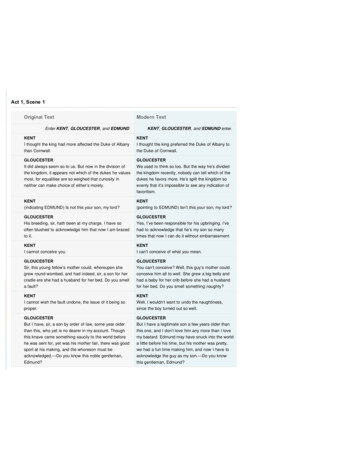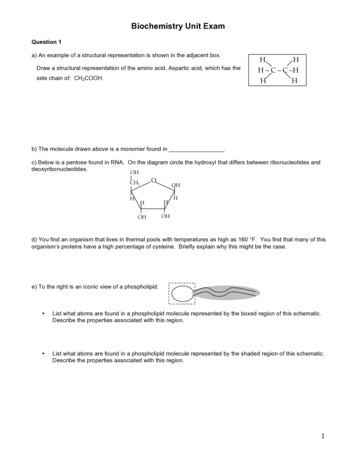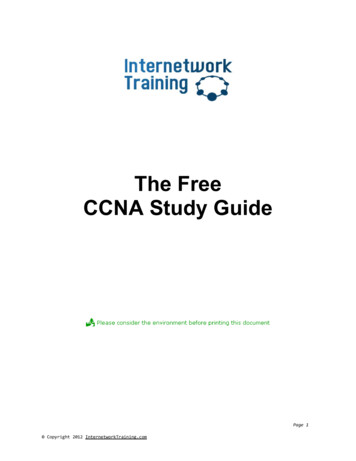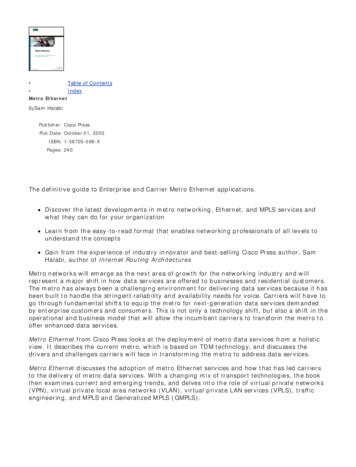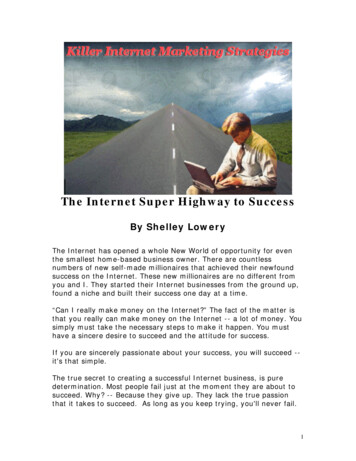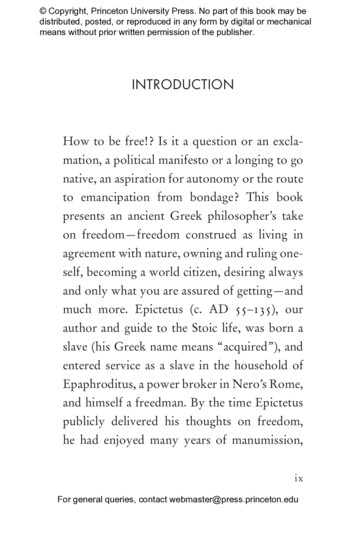
Transcription
Copyright, Princeton University Press. No part of this book may bedistributed, posted, or reproduced in any form by digital or mechanicalmeans without prior written permission of the publisher.INTRODUCTIONHow to be free!? Is it a question or an exclamation, a political manifesto or a longing to gonative, an aspiration for autonomy or the routeto emancipation from bondage? This bookpresents an ancient Greek philosopher’s takeon freedom— freedom construed as living inagreement with nature, owning and ruling oneself, becoming a world citizen, desiring alwaysand only what you are assured of getting— andmuch more. Epictetus (c. AD 55– 135), ourauthor and guide to the Stoic life, was born aslave (his Greek name means “acquired”), andentered service as a slave in the household ofEpaphroditus, a power broker in Nero’s Rome,and himself a freedman. By the time Epictetuspublicly delivered his thoughts on freedom,he had enjoyed many years of manumission,ixFor general queries, contact webmaster@press.princeton.edu
Copyright, Princeton University Press. No part of this book may bedistributed, posted, or reproduced in any form by digital or mechanicalmeans without prior written permission of the publisher.I ntroductionbut the experience of slavery left its mark onhis philosophy through and through. The firstlesson of the Encheiridion, his handbook guideto Stoicism, insists that everything that is trulyour own doing is naturally free, unimpeded,and unconstrained.Freedom, according to this notion, is neitherlegal status nor opportunity to move around atliberty. It is the mental orientation of personswho are impervious to frustration or disappointment because their wants and decisionsdepend on themselves and involve nothing thatthey cannot deliver to themselves. The EmperorMarcus Aurelius (reigned AD 161– 180) tookthe point and reflected on it in his Stoic Meditations. And the novelist, Tom Wolfe, followedsuit when, in his 1998 novel A Man in Full, heimagines his young hero escaping from both aliteral and a metaphorical prison after readingand digesting the Discourses of Epictetus.xFor general queries, contact webmaster@press.princeton.edu
Copyright, Princeton University Press. No part of this book may bedistributed, posted, or reproduced in any form by digital or mechanicalmeans without prior written permission of the publisher.I ntroductionThe chief constraint on personal freedom inancient Greece and Rome was what Epictetusknew at first hand, the social practice and indignity of slavery. It was slavery, the conditionof being literally owned and made to serve atanother’s behest that gave ancient freedom itsintensely positive value and emotional charge.Slaves’ bodily movements during their wakinglives were strictly constrained by their masters’wishes and by the menial functions they wererequired to perform. But slaves, like every oneelse, had minds, and minds as well as bodies aresubject to freedom and constraint. You can beexternally free and internally a slave, controlledby psychological masters in the form of disabling desires and passions and cravings. Conversely, you could be outwardly obstructed oreven in literal bondage but internally free fromfrustration and disharmony, so free in fact thatyou found yourself in charge of your ownxiFor general queries, contact webmaster@press.princeton.edu
Copyright, Princeton University Press. No part of this book may bedistributed, posted, or reproduced in any form by digital or mechanicalmeans without prior written permission of the publisher.I ntroductionwell- being, lacking little or nothing that youcould not provide for yourself. The latter, inessence, is the freedom that Epictetus, the ancient Stoic philosopher, made the central themeof his teaching.Epictetus in His Time and PlaceIn the early years of the second century ofour era, this ex- slave established a school foryoung men in the northwestern Greek city ofNicopolis, which had become a fashionablemetropolitan center. One of his students wasa brilliant youth called Arrian. Lucius Flavianus Arrianus, to give him his full name, wasso impressed by his teacher’s message that heproduced eight books of Discourses from thelectures on Stoicism he had heard Epictetusdeliver, writing them out in more or less verbatim form; and he also drafted the summaryof them that we know as the Encheiridion, orxiiFor general queries, contact webmaster@press.princeton.edu
Copyright, Princeton University Press. No part of this book may bedistributed, posted, or reproduced in any form by digital or mechanicalmeans without prior written permission of the publisher.I ntroductionhandbook. The work you are presently reading, “How to Be Free,” contains my translations of the Encheiridion and of nine excerptsfrom the four surviving books of Discourses.Arrian went on to have an illustrious career inRoman administration, and he published manyother books including a history of Alexanderthe Great. We don’t know how he managedto reproduce the actual words of Epictetus,but the text that has come down to us, written in koineˉ, the colloquial Greek also used inthe New Testament, is clearly the voice of histeacher and not merely Arrian’s adaptation ofthe way the philosopher spoke.As a guide to the Stoic life, Epictetus’s philosophy, especially in the Encheiridion format,has been popular ever since the text was firstedited and printed in the sixteenth century.Translated and retranslated into numerous languages, his words strike home because theyxiiiFor general queries, contact webmaster@press.princeton.edu
Copyright, Princeton University Press. No part of this book may bedistributed, posted, or reproduced in any form by digital or mechanicalmeans without prior written permission of the publisher.I ntroductionfocus so sharply and memorably on situationsthat are the common lot of people at e very timeand place. The emotions to which he propoundsremedy— fear, anxiety, envy, anger, resentment,grief— are everyone’s experience, whether youlive in Imperial Rome or modern America. Tothat extent Epictetus needs no introduction.Yet, while many of the scenarios he pictures arefamiliar place- fillers for our own experience,they also include his distinctive milieu and themores of his distant time.We find ourselves in a world that includesslaves (Encheiridion 12, 14, 26), public baths(ibid. 4, 45), games in the arena (ibid. 29, 33),and professional fortune tellers (ibid. 32).A hazard that Epictetus himself had experienced is exile (ibid. 21). Imperial Rome andits provinces were managed by a highly regimented and competitive system of offices andoffice holders (ibid. 19, 24). Jockeying forxivFor general queries, contact webmaster@press.princeton.edu
Copyright, Princeton University Press. No part of this book may bedistributed, posted, or reproduced in any form by digital or mechanicalmeans without prior written permission of the publisher.Introductionposition was endemic, and it included lookingfor patrons, attending banquets, and seeking toimpress influential figures (ibid, 19, 24, 25, 33).Epictetus dwells on the value of maintainingone’s independence, which reminds us that hisyoung students, like Arrian his recorder, wereon the threshold of making their careers in theImperial army or civil service. It was a male- dominated culture, as he indicates with his remarks about women and female roles (ibid. 40),but the Encheiridion in general has no obviousgender orientation, and it is completely freefrom machismo. The “you” and “we” Epictetus addresses could be any of us with minimalneed to register cultural difference.The Roman world of his lifetime was anabsolute autocracy, headed by the emperor orCaesar. Epictetus rarely touches on politics,mentioning Caesar only once in this book’smaterial (Discourses 3) and omitting all allusionxvFor general queries, contact webmaster@press.princeton.edu
Copyright, Princeton University Press. No part of this book may bedistributed, posted, or reproduced in any form by digital or mechanicalmeans without prior written permission of the publisher.I ntroductionto historical events. In the complete Discourses(e.g., 1.2) he does occasionally refer to historical figures who resisted imperial demands, buthe stays completely silent concerning the emperors who ruled at the time of his teaching inGreece. Though freedom had been an important Stoic notion from the beginning, it owesits special importance in Epictetus not only because of his early life as a slave but also becausethe people he was addressing had no prospectsof enjoying political autonomy.Stoicism and FreedomStoic philosophy had originated in Greece atthe end of the fourth century BC. Its foundingfathers were eastern Mediterranean immigrantsto Athens, which was no longer a vibrant democracy, as the city had been at the time ofSocrates, but a client state of the kingdom ofMacedonia. Loss of political autonomy wasxviFor general queries, contact webmaster@press.princeton.edu
Copyright, Princeton University Press. No part of this book may bedistributed, posted, or reproduced in any form by digital or mechanicalmeans without prior written permission of the publisher.I ntroductionreflected in philosophy at Athens by an inwardturn in the focus of ethics. Neither Stoicismnor Epicureanism, the other leading Hellenistic school, engaged strongly in political theory,as their predecessors Plato and Aristotle haddone. The main focus of the younger philosophers’ societal attention was not politics andlegislation but personal well- being and self- improvement. This inward turn is strikinglyillustrated by the way Stoic thought from itsbeginning treated freedom and slavery as primarily ethical and psychological denominatorsrather than marks of social status. Accordingto Zeno, the original head of the Stoic school,freedom is the exclusive prerogative of thosewho are wise, while inferior persons, who comprise the majority of people, are not only foolsbut also slaves.A first reaction to this claim could include shock at its intellectual elitism and itsxviiFor general queries, contact webmaster@press.princeton.edu
Copyright, Princeton University Press. No part of this book may bedistributed, posted, or reproduced in any form by digital or mechanicalmeans without prior written permission of the publisher.I ntroductioninsensitivity to the plight of persons unfortunate enough to be literally enslaved. Butnow consider how radically Zeno’s claim, in aslave- based economy, challenges the evaluationof persons in terms of the conventional servitude/freedom dichotomy. If wisdom is the truecriterion of freedom, the principal burden ofslavery shifts from the outer to the inner, fromthe physical to the mental, and philosophy notmanumission becomes the source of liberty. Youare enslaved, according to this uncompromisingdoctrine, if you set your heart on anything thatis liable to impediment, whether because yourbody lets you down, or passions and emotionshave you in their thrall, or you attach your well- being to things that depend on others— people,property, popularity, or simply luck.In his celebrated essay “Two Concepts of Liberty,” Isaiah Berlin distinguished between the“negative” notion of freedom from coercion (notxvii iFor general queries, contact webmaster@press.princeton.edu
Copyright, Princeton University Press. No part of this book may bedistributed, posted, or reproduced in any form by digital or mechanicalmeans without prior written permission of the publisher.I ntroductionbeing interfered with by others) and the “positive” notion of freedom to be or to live as onechooses (self- mastery or self- determination).For Epictetus these two notions come togetherso closely that they entail one another, as we cansee in the following passage:Our master is anyone who has the powerto implement or prevent the things thatwe want or don’t want. Whoever wants tobe free, therefore, should wish for nothing or avoid nothing that is up to otherpeople. Failing that, one is bound to be aslave. (Encheiridion 14)We could rewrite the second sentence along thelines: “Whoever wants to be free from coercionshould restrict their wishes and aversions tothings over which they have complete control.”How can we be sure that such choice is goodfor us and good for those whose company wexixFor general queries, contact webmaster@press.princeton.edu
Copyright, Princeton University Press. No part of this book may bedistributed, posted, or reproduced in any form by digital or mechanicalmeans without prior written permission of the publisher.I ntroductionshare? Why be self- reliant rather than followthe ten commandments or some other set oftime- honored principles? How can we knowwhat to choose? The answer to these questionsbrings us back to Zeno’s “wisdom” as the essence of freedom. His Greek word sophia, inits ordinary usage, can cover any kind of expertise, ranging from practical craftsmanshiplike carpentry to abstract knowledge such asgeometry. In all cases, sophia signifies successful practice of a skill, and the skill thatconcerned Zeno and subsequent Stoic philosophers is the art of life. We can gloss this artas knowing how to live in harmony, harmonywith our human nature and harmony with oursocial and physical environment. To achieve ortry to achieve that understanding is the task ofreason, and reason, according to Stoicism, iswhat makes human beings distinctive amonganimals (Discourses 7, 8).xxFor general queries, contact webmaster@press.princeton.edu
Copyright, Princeton University Press. No part of this book may bedistributed, posted, or reproduced in any form by digital or mechanicalmeans without prior written permission of the publisher.I ntroductionEpictetus as Stoic TeacherThe texts of Epictetus that you will read hereelaborate on these doctrines and explore theirimplications as guidance for everyday life. Hiscontexts cover an enormous range of situations,ranging from mundane ci
mores of his distant time. We find ourselves in a world that includes slaves (Encheiridion 12, 14, 26), public baths (ibid. 4, 45), games in the arena (ibid. 29, 33), and professional fortune tellers (ibid. 32). A hazard that Epictetus himself had experi-enced is exile (ibid. 21). Imperial Rome and its provinces were managed by a highly regi-mented and competitive system of offices and office .


